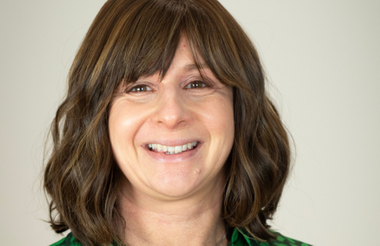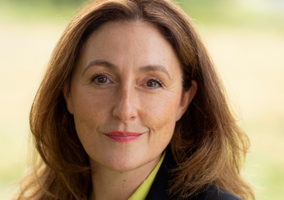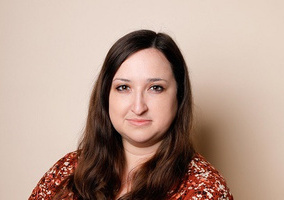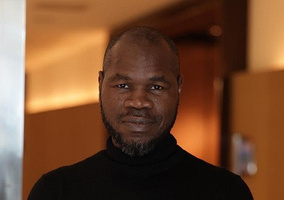When Naomi Dickson joined Norwood as chief executive last year, she landed her “dream job”.
“It is the biggest social care agency in the Jewish community. It’s been here for 235 years. Its values are rooted in Jewish values – I feel like I’m standing on the shoulders of amazing people,” she says.
“It started as an orphanage, it has done fostering, it has done adoption, it’s done social services, and it’s still here because it’s had excellent leadership of people who have sat down and thought: ‘What’s the actual need?’
“This is not about ego, it’s not about us being here for the sake of being here, it is about Norwood being here to meet the needs of the people who need us the most.”
In the past year, Dickson has been working on forming her own leadership style.
“I’m never going to be the person who enjoys doing townhalls to an organisation, I’d much rather go and connect with lots of different people.”
‘Volunteering was at the heart of everything’
Growing up in Leeds, Dickson’s family always volunteered, so joining the charity sector was a natural choice.
“It was just kind of expected that you volunteered and in a charity. Both my parents did and all my grandparents did. Everyone in my community did.
“My family’s take on it, and the values that I grew up with, were always around making sure that people who were experiencing disadvantage have got a fair shot at life.”
Her first role was in the housing sector where she was managing estates. Dickson had a large caseload of people who were exposed to different forms of disadvantage – “people were just struggling to cope”.
Dickson worked with a lot of women who were experiencing domestic violence, which led to her volunteering in a local refuge.
One day, one of the women she was supporting on the housing estate said she thought her partner was going to kill her, and asked Dickson for help.
“I picked up the phone to a really nice, tiny little organisation, and they said: ‘Get her to this point, here’s a set of keys.’ Off she went and she fled. That was the point where I just realised that I could change people’s lives through working.
“From there, I moved into the world of domestic abuse, where I worked for 16 years.
“But having that background in housing has really served me very well now coming into the social care sector.”
Changing attitudes
Dickson’s charity sector career has included eight and a half years as CEO of Jewish Women’s Aid.
She says her focus throughout her time in the sector has been on influencing attitudes and amplifying voices.
“I’ve always felt that if you’ve got a platform at a charity, your job is to use that platform to amplify the voices of people that you’re there to support – to give them an opportunity to speak, to get their messages upwards.
“When I was in the women’s aid sector, for women who are exposed to domestic abuse, their voices have been squashed for many, many years.”
Part of this meant influencing community leaders, rabbis, politicians, and enabling them to understand that “women have got a voice and the people we support needed their voices to be heard”.
Dickson says she has faced some resistance, with some parts of the Jewish community feeling a domestic abuse organisation was there to break up marriages, but she was able to show “it was about ensuring safety for women and children and sustaining families” instead.
“Changing attitudes is a thread that I have kept in this new role,” she adds.
Covering the charity’s costs
Norwood gets most of its revenue from local government with £17.3m of its overall £27.7m income coming from public contracts in the year to March 2023.
It also fundraises from its supporters and raised £7.9m in 2022-23, compared to £10.6m from donations and legacies before the Covid-19 pandemic.
Dickson joined Norwood when it was reeling from the Covid-19 pandemic and being hit by the cost-of-living crisis.
“I was able to pick up at a point where there was tiredness and exhaustion, but there was also kind of an air of shaking off and ambition and optimism, particularly within Norwood, where we’re starting to set a new strategy and look to the future.
“I’ve really been able to benefit from loads of people in the sector, there’s huge amounts of support in the Jewish community for Norwood, people are very fond of it, and that’s absolutely testament to the hard work of the staff.”
Nonetheless, Dickson says: “It’s a really difficult social care environment. So, like all other sector providers, our job is to make sure that the fees that we are getting for the individuals that we support, actually cover the cost of care.
“And like a lot of other agencies in the sector, it just hasn’t been up until now; local authorities are quite cash strapped, and funding has been stripped back to the bone.
“And so a lot of the work that I’ve done with my team over the last year is just making sure that actually, we know what each individual costs us to, in terms of support workers, and managing the buildings and everything, and that we’re claiming the right amount back from the local authorities.
“It’s a massive challenge in the sector. When I go to conferences and speak to colleagues, everybody’s fighting the same battles. And that means that it’s really hard because we’re all asking for the same thing.”
Norwood provides culturally-specific services but they are not faith-based, says Dickson.
“People choose Norwood because they want their loved one to live in a Jewish environment, because that’s their culture and their background, and their ancestry. We fundraise to enable that to happen.
“All of that is funded really by local community funding and fundraising. What it means is that we’re able to add an extra layer of depth and richness to the support that we offer to the individuals.”
Pay increases
Norwood applies annually for uplifts to fee packages from local government, with the level of uplift depending on the authority.
Dickson says it is therefore important for her charity that councils are adequately funded to enable pay increases for her staff.
“Making sure that the local authorities are able to support the agencies with appropriate pay is really important. I would ask government to make sure that the pay increases are sustainable, and so that we can help to recruit and retain staff.”
Dickson also hopes to see a focus on the disability employment gap, and she says there are a huge amount of disabled people who want to work, but it’s hard to find suitable opportunities.
‘Renewed sense of optimism’
Dickson wants to continue to make sure that the charity is taking a “holistic” approach to supporting individuals and families, and she is proud of the charity and its work so far.
“It’s very intangible, but I think what I’ve achieved, and I’m really proud of achieving, is a renewed sense of optimism and ambition in the charity.
“People have all come to see me and tell me ‘everybody comes to work here for the right reason’. And I think sometimes because of a variety of environmental factors, it’s very easy to lose your mojo in the sector and just feel a bit exhausted. And actually, there’s a real sense of possibility.
“There’s a new strategy, there’s new values, there’s new leadership, we’ve got a new chair who’s extremely ambitious, we’ve got a few new trustees. It feels like we’re just getting ready to shoot for the stars, which is a really, really nice place to be.”
Related Articles












